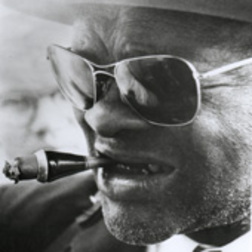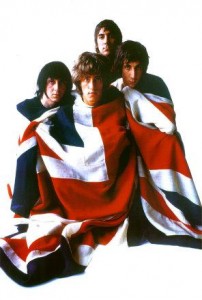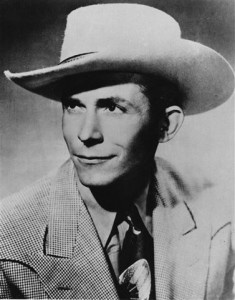Pulled three albums tonight from the Rev. Gary Davis. These are ‘The Guitar and Banjo of Rev. Gary Davis”, “Harlem Street Singer” and “Have A Little Faith”. Not a terrible amount to say tonight (it’s been a long day), but they are all great albums. ‘The Guitar And Banjo” disc is particularly interesting though if you haven’t heard anything by him before though. All the tracks are instrumentals and at times it sounds like two or three guitarists are playing. Also interesting to me is that on these recordings, it sounds like they were done with a very close microphone. You can practically hear the pick on the strings – and in many of these songs, he is hitting the guitar hard. So much so that on some tracks it feels like there is actually space between each note of a chord as a result of the time it takes for the pick to get one string going, travel through space and grab onto the next. I don’t know if I have ever heard this much detail in a solo guitar recording before, and it adds a weight to the tunes. His version of Scott Joplin’s ‘Maple Leaf Rag’ is very good, and once I hear his ‘United States March’ it will usually be stuck in my head for a couple hours. ‘Harlem Street Singer’ starts off with ‘Samson and Delilah’, possibly the version members of the Grateful Dead heard before recording it themselves on ‘Terrapin Station’.
Archive for the ‘Folk / Blues / Country’ Category
Day 34. Rev. Gary Davis.
Monday, February 22nd, 2010Day 22. Weezer, Hank Williams and The Who.
Tuesday, February 9th, 2010There was an article the other day on NPR.org about Taylor Swift and her lackluster performance at this year’s Grammys. It goes on to say that it is perfectly fine to criticize a performer (especially a singer) that can’t really sing in a live setting. The evidence of this (in Swift’s case) wasn’t just the Grammys, but a large number of videos on YouTube and other comments about concert performances. I agree with the judgement above, and would go even further to say that this should be the case not just in live performance but also in regard to recordings. Recordings have really reached the point of being more production then a ‘record’ of anything that actually occurred. I know the medium itself allows for this, and this can certainly be traced back to The Beatles and other bands of that time that started to realize the benefits of multi-tracking and over-dubbing. And it is to the credit of The Beatles that they recognized this. They knew the sound that they wanted to create was no longer performance, but a patient crafting of a sonic result similar to the ‘music concrete’ and electronic music that was happening in the European avant-garde at the time. So, they stopped touring. And personally, I tend to look at a ‘recording’ of a piece as a different object then I do a live performance. Both have aspects that are exciting… but do most of the pop music industry’s stars realize this? Do they not know where there talents end and auto-tune begins?
So when I saw the video of The Who at last weeks SuperBowl, I was quite struck at how much performing was going on for a half-time show. Lip-syncing is much more the norm in those situations, but you could see that what we were hearing (flubs and all, and there were only a couple) were coming from the guys on the stage. Granted – The Who have been performing for a very long time – they have more experience then Taylor Swift will probably ever have the chance of having… but here is a link to a clip from an earlier time:
http://video.google.com/videoplay?docid=-3099526434105125496#
Aren’t these guys amazing? I mean… damn, they could sing, play AND put on an amazing stage presence.
Then there is the other side of the coin – there are some that may never have the best voice or even performance style. And I tend to put Hank Williams (along with Bob Dylan and Tom Waits) into this category. Yet their music is compelling all the same because of the depth in the words and music. While I would probably prefer to hear Peter, Paul and Mary sing ‘Blowin’ In The Wind’, hearing it straight from Dylan’s mouth is amazing in its roughness. Patsy Cline’s version of ‘Your Cheating Heart’ has the same relationship to Hank Williams’. She brings such a grace and elegance to the song… but when Hank Williams sings it, his voice brings a feeling that this is a guy who is a bit of a mess at the moment. The falsetto breaks are not graceful at all, but they have so much emotion in them!
So – maybe Taylor Swift needs to find those vocal quirks that are hers and try to turn them into a strength? Maybe the music industry itself needs to start looking into a clean mirror rather then a funhouse mirror filled with distortion? Or – perhaps the changes in the recording industry in general away from albums (as CDs start to phase out) will start to bring about a different change … perhaps live performance will once again come to the forefront as it was before ‘Sgt. Pepper’ came out? The last thought is wishful thinking on one hand, but also a little ironic since this whole project/blog is about my attempt to re-capture thousands of recordings… I certainly can’t have TOO much of a problem with recordings since I obviously have been in the habit of collecting as many as I can.
Day 7. Muddy Waters and Schubert.
Tuesday, January 26th, 2010I forgot to get the girls downstairs tonight before they went to bed, so I closed my eyes and picked today’s rips. Two from blues legend Muddy Waters and Wilhem Kempff’s Schubert Sonata box set.
The first of the Muddy Waters discs is a set of field recordings that were captured in Mississippi in the 1940s. They sound quite a bit like most of the most of the other excellent Alan Lomax recordings that were done as part of a large Library of Congress recordings put into motion by Roosevelt’s public works projects that were contained in the New Deal. When the recordings were made, Muddy Waters (in his mid-20s) was living in a cabin on a plantation. There are interviews between him and Lomax on the disc as well, and I am stunned by how well these recordings capture a sense of what it must have meant to be a country blues musician in Mississippi during the great depression. When Lomax asks: “How did you learn to play with a bottle” Muddy Waters says “I found it on the ground and I picked it up”. They talk some more then Lomax asks him to play another song and they record it. Most of these are solo recordings, though a couple feature a second person. A couple of years later Muddy Waters would move to Chicago, and within a few more years he would become a very successful blues musician. By the time the recordings for “Folk Singer” were done in Chicago in the early 60s, Muddy Waters has a full band and much more then a portable recorder at his disposal. He has a full band and a full studio. You can also tell how much better Muddy Waters had been able to eat from comparing the pictures contained in both discs.
But between both, Muddy Waters still plays and sings like a traditional blues singer. His music was influencing rock singers in the US and UK by this time, and in return he was able to make a living in Chicago and record his music in a studio (so – in a way the music industry that he was influencing was also effecting how he worked!). And while the recordings in Chicago are made by a much more established and comfortable musician, the feeling is still all there. He is the older version of that amazing musician that Alan Lomax caught in the fields of Mississippi. There is change that has occurred, but the ‘Folk Singer’ recordings feel like as much of a document as the field recordings do. The first ‘Ooooh!’ in ‘My Captain’ has the echo of the music in the Lomax recordings. But it is an echo, and you get the sense that what has changed is that the 1960s Muddy Waters remembers his roots as well as the hard work that found him success making a living as a musician in Chicago.
The Schubert box is one that I purchased mostly because of how much I love Kempff’s Beethoven playing. I wasn’t familiar with Schubert’s sonatas when I bought it and had no idea what I was in for the first time I listened to 21 minute first movement to the B-flat sonata. This is huge, expansive and lyrical music. At first it seems to hold such a direct relation to Beethoven, but as the music expands Schubert’s gifts for lyricism become more and more apparent. When I played piano more, I always had a great amount of difficulty in handling the dense textures that Schubert often uses in his accompaniments. Large block chords that are repeated under the melody. To me they always seemed to be a mistake, as though they were actually supposed to be scored for strings (partly because it is a texture that Schubert uses so much in his string quartets as well!). But hearing Kempff play them, there is almost no attack – no repetition. Just swells and decrescendos of pulse and texture. He is able to pull them back like curtains to reveal a counter-melody, then let them fall and obscure again. His touch is amazingly nuanced with these gestures, and after I heard him play these pieces, I felt like I knew what I had to work towards.
I have never been happy with how I play Schubert as a result. And I remember thinking that it must just be something about the recording. How could anyone actually play these block chords so smoothly? But I’ve heard other pianists play this music since (both live and on other recordings), and I am constantly amazed at the effect. How can someone can strike the strings so softly, even when playing loudly? While I feel comfortable playing Bach and even some Beethoven and Chopin, I wonder if I’ll ever be able to figure out the touch that is needed to really play Schubert well.






